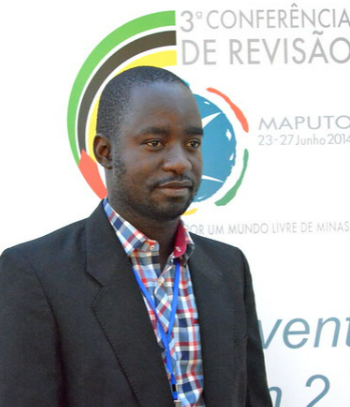Mamady Gassama has lived many lives. He has worked in finance and served as an interpreter. He also had a life changing experience at the age of 14, which would in time reveal his true calling. Mamady, like many others in Senegal, had a landmine accident; but unlike some, he was fortunate to survive. This pivotal moment became a catalyst for change and marked the start of his journey into humanitarian work. He founded and volunteered for ASVM (Senegalese Association for Mine Victims), a groundbreaking achievement in a country where risk education was nonexistent. Since then, he has made a significant impact in transforming the field. His unwavering commitment to integrating survivors into mine action efforts, alongside his emphasis on sustainable, localized solutions, makes him as true force for change.

Behind a somewhat serious expression, Mamady’s eyes gleam with passion. He is inspired and inspiring, as his life is a story to be told. He is no stranger to the devastating effects of explosive ordnance (EO). Hailing from Ziguinchor in the Casamance region, his life took a dramatic turn when he became a mine survivor. He had heard about mine accidents, but in 1998, without risk education, people did not know what behaviour to adopt. Rather than letting this tragedy define him, he harnessed his experience to shape his life purpose: dedicating his time and energy to prevent others from enduring the same fate. In 2005, alongside other mine survivors, he co-founded ASVM, an organization that would play a key role in making risk education a reality in Senegal.

“I’m motivated by bringing lifesaving messages to people. As a mine survivor, I don’t want to see people suffer the way I did.”
Mamady’s trauma became his strength, his driving force. He recognized the critical need for risk education and community outreach, especially in a region where the too frequent and high number of mine accidents resulted from a lack of awareness. It was time to act and make a difference. Mamady and his community volunteers used their own stories to highlight the harsh realities of contamination. Their efforts have contributed to a decrease in accidents, year after year. Since 2017, not a single child has fallen victim to a mine in the country.

“It is better to be in the field to promote risk education. When people see us with our disability, they understand that what we are talking about is a reality.”

Initially, ASVM was created without any external support or funding, but its efforts soon caught the attention of international organizations like UNICEF and Handicap International (HI), ICRC, ICBL etc... Despite a long-lasting partnership with HI, funding still remains a challenge, as gaps can last up to two years. However, Mamady’s motivation never falters. He brings forward innovative approaches to ensure the organization’s continued presence in the field. One of his strategies for overcoming the financial uncertainties has been to train local community members as “relais communautaires,” or community focal points. These individuals live near affected villages and can deliver risk education when and where it is mostly needed.

“Even if we don’t have funding, they do dissemination, and are working closely with the community,” Mamady explains. “People trust them as experienced supports in the area.”
Mamady is now a Weapon Contamination Field Officer for ICRC sub-delegation where he advocates for an integrated, multidisciplinary approach to EO management. Beyond delivering safety messages, Mamady and his team have implemented complementary measures, such as constructing wells to prevent people from venturing into contaminated areas in search of water and supporting alternative livelihoods, like oyster fishing, to reduce exposure to dangerous agricultural lands. He also emphasizes the crucial importance of integrating risk education into national programs, as true localization cannot be achieved without this support.

“You are not just delivering the message; you are saving lives.”
Mamady is a survivor, who carries with him a unique kind magic marked by dedication and resilience, which he shares with those around him. People see him for who he truly is, welcoming him into their homes with respect and admiration for his work. They listen to his powerful words, because, above all, they carry his love for life. And that is the most profound message he can share.
Photo credits:
- Meeting with the Burundi Delegation with the International Campaign to Ban Landmines. ©ICBL
- Participating in the Mine Ban Treaty Third Review Conference in Maputo in 2014. Credits unknown
- Installing EORE posters in Diocadou, Ziguinchor, in 2018. ©ICRC
- In front of the ICRC car, about to take the road for a field visit in Casamance. ©ICRC
- Installing EORE posters in Diocadou, Ziguinchor, in 2018. ©ICRC
